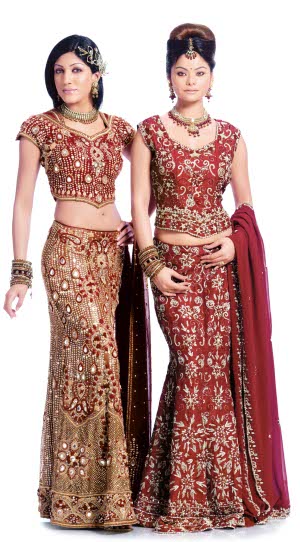 You've waited for this day all your life. Meticulously planning over the months for what your shoes, hair, lehenga and make-up should look like.
You've waited for this day all your life. Meticulously planning over the months for what your shoes, hair, lehenga and make-up should look like.You've scoured the designer stores, browsed the wedding fairs and consulted every fashion magazine. Finally, you have it all covered and feel on top of things. There's not one embroidery trend you've missed and not one flounce of chiffon you haven't considered.
Finally, you're hoping to look like the perfectly stylish bride you have always envisaged yourself as – and lo and behold, suddenly, without warning, the trends change. Now D-day is fast approaching and you’re consumed with doubt! Fish tail lehenga or a flowing sari? Mokaish work or zardosi? Decisions, decisions, decisions! You are confused about what to settle on for your BIG day. Worry not, for there is help at hand.
But before that, one word of advice: Don't let passing trends get the better of you. Bridal trends do not change radically from season to season. Of course, we designers would like you to believe so. But, if you go with your gut and don't let the tiny ripples of fashion sway your resolve, you’ll have a fabulous look at your fantastic wedding - minus the fainting spell.
Having said that, here's a look at what's in trend this Bridal season.
For ceremonies such as the engagement, pale and pastel colours tend to be ideal. These include the likes of mint green, lilac, light olive, sunshine yellow, beige gold, icy blue and light rose. A sari with delicate sequin, bead and crystal embroidery all over the body and pallu will be a fittingly demure evening look. Or go for a wide-bordered and heavily-worked pallu with butis all over the body, giving a bold and classy look. Mokaish work - which is back in fashion now - on gauzy chiffon, is a subtle and classy alternative. The fully-flared kalidar kurta, cinched under the bust and grazing the knee, worn with a chudidar is really in vogue these days. For the fashion-conscious bride, a jodhpur-style chudidar teamed with a kalidar kurta and a skinny dupatta would be ideal for the cocktail night. Here, embellishments can vary from velvet appliqué embroidery to zardozi, to beaten zari work in the form of butis, stripes or florals for a formal evening look.
The mehendi ceremony calls for a colourful and bright lehenga choli ensemble, complete with stylised neckline, cap sleeves, doris and latkans to add to the bride’s charm. Colours such as turmeric, sage green, vermillion, cobalt blue, pink, peach, or saffron, and combinations thereof, are ideally suited to the mood of the event. Mirror-work combined with light sequin work would add a joyous and shimmering touch to the bride's attire. The multi-panel flared lehenga being an almost essential component of the look of the glowing bride - arms and legs bedecked with mehendi merrily dancing away to the sound of the dhol, surrounded by happy friends and family. On this occasion the bride’s comfort should be paramount. For example, the choli should have short or cap sleeves so as to be accommodating to the mehendi as it unfolds on the bride's palms. The lehenga should not be too heavy - it should be comfortable for the bride to sit while the mehendi is being applied, and later to carry herself once adorned. Embroidered net may be a pretty option for the lehenga and dupatta, while satin for the choli would add the right finishing touch.
Ombre dyeing is the in-thing for stylish saris and lehengas alike. Geometric florals, jewellery-inspired embellishments with pearls, stripes and diamond shapes are the new motifs for embroideries. Embellished jacquards and brocades are must-haves, while intricate gota embroidery is seeing a revival as well.
For the wedding, most often it is tradition that rules, and a demure lehenga in colours from peach to red, to deep pink, to maroon are called for. Embroidery must look rich, regal and intricate and the dupattas must be full with thick borders.
Cholis can either be short or low-waisted, but the necklines should be well stylised with ties and tapes, embroidery and tassels. Scoop necklines are best for the bride to show off her jewellery.
No comments:
Post a Comment